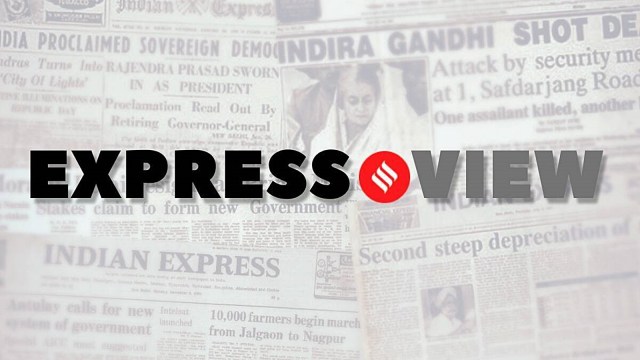
RESULTS OF THREE out of the four assembly elections in this round underline, quite simply, that both when the BJP is the incumbent and when it is the challenger, it is more equipped and able to win the people’s trust than its main rival, the Congress. They show, also, that the appeal and popularity of Prime Minister Narendra Modi now reaches into the states and papers over the wear-and-tear in state units of the BJP. A four-term BJP government has returned to power in Madhya Pradesh with a staggering margin, after the party high command had taken over the reins of the campaign and shifted the spotlight away from Chief Minister Shivraj Singh Chouhan. In Rajasthan, too, the BJP relegated its most prominent state leader, kept Modi at the centre, and won handsomely. A similar story played out in Chhattisgarh.
This is not to say that centralisation of power and weakening of state leadership is a winning model. It is to point out, instead, that, in the present moment, the organisational and political force of the Modi-BJP has succeeded in narrowing the gap between the calculus of the voter at the level of the Centre and the state, and in blurring the distinction between the two that she was seen to make. And that, for now, even if the BJP’s promise of double-engine sarkar does not deliver in terms of governance, it gives it a clear advantage among the voters politically.
THIS NARROWING OF distance between the central and state arenas, and Modi’s ability to enter the state election as a leading player and swing it, seem to be the striking takeaways of this round of polls. But they may only reflect the rising to the surface of deeper and longer political shifts. It may also be reductive to see these shifts as the outcome of a single factor, or to give them a hold-all label of, say, polarisation. The BJP’s serial victories speak of a coming together of a strong organisation whose will to power is sharpened, not assuaged, by every win and a welfare push that consists of a panoply of schemes that identify distress, touch voters’ lives and are implemented effectively. They crucially depend on Modi’s constant invocation of larger wholes, affirmative and aspirational identities, and imagined communities constructed around religion, culture and nation, and the nation-in-the-world. The Modi pitch includes a blending of a sense of forward motion, a trajectory of progress, and the hard work of getting the voter to buy in.
THESE ELECTORAL OUTCOMES are not just due to the success of the BJP, but also because of Congress failure. The Congress lacked a coherent campaign in the two states it lost, Rajasthan and Chhattisgarh, and in the third, MP, that it failed to win – its campaign was as good or as bad as its individual candidates. This was not because of a considered strategy to go local, but more, because there was no strategy to begin with. A fragmented and splintered Congress lacks a coherent and binding idea or theme. Even when it throws up an idea like the caste census at the national level, it is not able to connect the dots to its own local leaders and then further to the voters on the ground. This disconnect shows up in the BJP overtaking it in the constituencies that it claims as its own – the Scheduled Tribes, for instance. This diminished and diminishing Congress must now face the formidable challenge of reviving the momentum, interrupted by this round of polls, of INDIA — the Opposition’s joint anti-BJP front — in the Lok Sabha polls, only months away.
THE RESULTS IN the fourth state, Telangana, are a warning and cautionary tale for the regional party. Six years after it was formed and soon after it won a second term in power, the Telangana Rashtra Samithi rechristened itself as the Bharat Rashtra Samithi (BRS). But it is now clear that far from becoming a national figure and a player in the national anti-BJP front, K Chandrasekhar Rao’s party was steadily losing its base and the political plot. Rampant perceptions of its take-over by KCR’s family, and allegations of corruption and ATM politics have meant that the young party appears to have surrendered its political potential and possibilities prematurely.
Welfare schemes alone – and KCR’s government had several, including the popular Rythu Bandhu programme — are not enough to distract attention from fundamental political cracks and an otherwise patchy governance record. That the KCR government was also accused of using a draconian detention law to stifle dissent only underlined how far the regional party was seen to have travelled from its origins in an encompassing statehood movement. The BRS tried to cover up its failures through appeals to regional pride in a new state, but to little avail evidently.
In Telangana, the Congress became the beneficiary of the vote against the KCR government, because it was there and because there was no third force. But the BJP, too, has made inroads, doubling its voteshare to 14 per cent, approximately. The Congress will now have to take on the challenge of delivering a responsive and efficient government, if it wants to own the victory that has been handed to it.